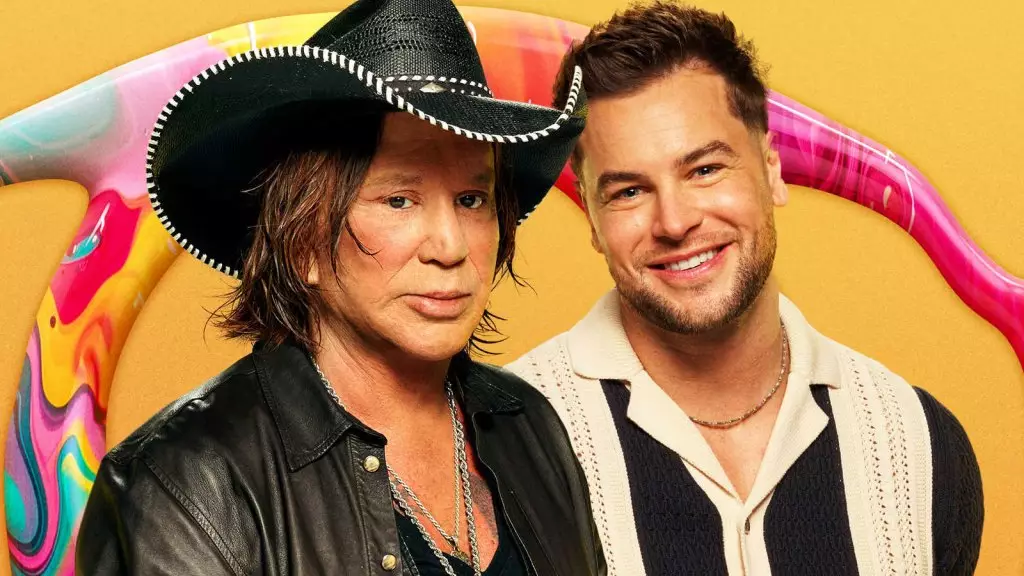In the world of reality television, where drama often reigns supreme, one would expect certain levels of outlandish behavior. However, the recent ejection of Mickey Rourke from the Celebrity Big Brother UK house serves as a cautionary tale about the consequences of unchecked aggression and inappropriate language. Rourke’s explosive temper flared up during an innocent pirate-themed task, a moment intended for camaraderie but instead spiraling into a heated confrontation with fellow housemate Chris Hughes. This incident was not just a blip on the radar; it forged a profound narrative questioning the fabric of celebrity culture and the ethical responsibilities that come with it.
A Breakdown of Boundaries
Rourke’s interaction with Hughes began with a seemingly benign exchange—a joke gone awry, perhaps—but escalated rapidly into a hostile exchange. His words, “Don’t eyeball me. You c***,” emphatically punctuated an apparent inability to navigate humor or critique without lashing out. The choice of language here is alarming; it not only reveals a failure to control his temper but also perpetuates an environment where degradation becomes coarse entertainment. Such behavior in a confined space like Big Brother isn’t just problematic; it sets a dangerous precedent about how conflict should be resolved—or, rather, how it shouldn’t.
Indeed, Rourke’s subsequent apology, where he stated that he had “lost his temper,” felt more like a rehearsed reflection than a sincere acknowledgment of wrongdoing. He indicated a struggle with anger management which, while relatable, remains insufficient in a setting where moderation should reign. By admitting that he is a “work in progress,” Rourke seems to excuse his erratic behavior rather than confront it head-on—this highlights a pervasive issue among public figures, wherein accountability is often brushed aside under the umbrella of personal struggles.
The Role of Reality Television
Reality television presents a fascinating dichotomy—while it aims to capture authenticity, it thrives on hyperbole and conflict. The instance with Rourke showcases this dichotomy vehemently. Big Brother acts as both an observer and a regulator, stepping in when situations spiral out of control. When Rourke faced the consequences of his actions, he was met not just with removal from the house but also with a broader public scrutiny that serves as a reminder of the weight carried by their actions.
The producers of such programs must grapple with their complicity in these scenarios. By casting individuals known for volatility and then amplifying their dramatic tendencies for ratings, the moral implications come into question. Is it entertainment or exploitation? Rourke’s ejection begs the question of whether this is a turning point for a series that has often embraced chaos as a cornerstone of its appeal.
Echoes Beyond the House
What resonates beyond the confines of the house is the systemic issue of casual aggression that stretches back to Rourke’s earlier behavior during the show, including incidents involving homophobic slurs. His pattern of inappropriate language not only alienates potential allies in the house but reflects poorly on his public persona. In an era advocating for inclusivity and understanding, such actions serve as a glaring inconsistency.
Moreover, the dimension of power dynamics cannot be overlooked. Fellow contestant JoJo Siwa’s response to Rourke’s remarks illuminated the discomfort that often hangs in the air during these confrontations. Siwa’s subsequent nomination of Rourke acts as a powerful statement about boundaries and the necessity for respect in any environment—be it a household of celebrities or a general workplace.
The irony lies in Rourke’s retrospective observations about ‘talking smack’ and claiming no ill will. This mentality highlights a broader cultural issue prevalent within celebrity culture—where inappropriate comments are often brushed aside as mere banter, trivializing the impact they may have on those targeted. It creates a toxic atmosphere that ultimately erodes the very relationships these individuals rely on in both their personal and professional lives.
Looking Ahead: A Mirror to Society
Mickey Rourke’s expulsion from Celebrity Big Brother UK serves not only as a reflection of his own inadequacies but also as a litmus test for society’s tolerance of unacceptable behavior. In an age where mental health, accountability, and personal growth take center stage, his journey illustrates the fragility of reputation and the brutal reality of televised scrutiny. As viewers, we must consider what we condone as entertainment and what we are willing to challenge. As the curtain closes on Rourke’s dramatic exit, one cannot help but wonder if this moment will serve as a catalyst for deeper conversations about conduct, respect, and the responsibilities of both celebrities and audiences alike.

Leave a Reply